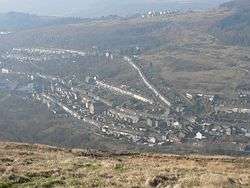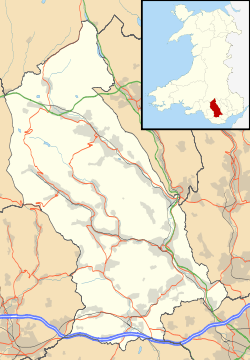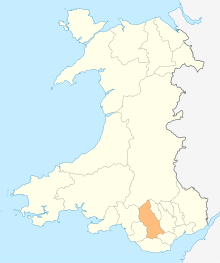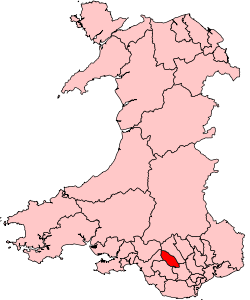Tylorstown
Tylorstown (Welsh: Pendyrus) is a village and community (and electoral ward) located in the Rhondda valley, in the county borough of Rhondda Cynon Taf, Wales. It is neighboured by the villages of Blaenllechau, Ferndale, Penrhys, Pontygwaith and Stanleytown.
Tylorstown
| |
|---|---|
 | |
 Tylorstown Location within Rhondda Cynon Taf | |
| Population | 4,546 (2011))[1] |
| OS grid reference | SS955965 |
| Principal area | |
| Ceremonial county | |
| Country | Wales |
| Sovereign state | United Kingdom |
| Post town | Ferndale |
| Postcode district | CF43 |
| Dialling code | 01443 |
| Police | South Wales |
| Fire | South Wales |
| Ambulance | Welsh |
| UK Parliament | |
| Senedd Cymru – Welsh Parliament |
|
History
By the mid 19th century, the potential wealth of the South Wales Coalfield was unapparent to many, but provided great opportunities to those with the resources and knowledge to exploit it. London geologist Alfred Tylor came to the area and purchased the mineral rights from Pendyrus Farm in 1872. Tylor soon opened Pendyrys Colliery on the site. The Colliery workers and their families were housed near the colliery on the former farmland, this area retained its name in Welsh (Pendyrus) but would come to be known as Tylor's Town in English.[2][3]
In January 1896, 57 miners were killed by an underground explosion in the Tylorstown pits, newly taken over by the Ferndale Colliery; the blast was so powerful it blew the winding gear off the top of the pitshaft.[4] Research on the causes of the fatalities in the Tylorstown disaster conducted by Prof John Scott Haldane was instrumental in the introduction of canaries to detect the presence of carbon monoxide in mines.[5]
The last working mine in the village closed in the 1960s setting off a long period of economic decline which worsened following the 1984–85 national miners' strike which resulted in pits in nearby locations such as Maerdy closing.[6] The local passenger train line closed in 1964 following the Beeching Axe which also limited the prospects of easy commuting to Cardiff.
In December 2006, the Rhondda by-pass, also known as the Porth relief road, opened. It terminates at neighbouring Pontygwaith due to the topography of the Rhondda Fach, which is a narrow valley with steep sides and limited flat land on the valley floor. The new road cost £98 million, included the construction or replacement of 11 bridges, including the Rheola Bridge. An engineering success, the road has done much to reduce traffic congestion and improve local economic prospects.[7]
Landmarks
The Welfare Hall was built in 1933 from red brick and stone in the French Baroque style. It is the last remaining miners' institute in the Rhondda Valley, and is now run as a community hub putting on shows, classes and a coffee shop by volunteers. In 2017 it was awarded £500,000 to renovate the building.[8]
The Holy Trinity Church, situated on a mound above the main road was built in 1882-3 by E.M. Bruce Vaughan. It features a five-light plate traceried west window and a stained glass window of Christ in Majesty made by monks of Prinknash Abbey in around 1980. There is a monument to Reverend John Rees who died in 1913. There is also a Conservative Club.[9]
The cemetery, situated half way up the hill to Penrhys features a chapel built in 1884 by W.H. Jenkins and T.R. Phillips.[9]
Governance
The Tylorstown electoral ward is coterminous with the borders of the Tylorstown community and elects two county councillors to Rhondda Cynon Taf County Borough Council. Since 1995 representation has mainly been by the Labour Party but the ward had a Plaid Cymru councillor from 1999 to 2004.[10]
A 2018 review of electoral arrangements by the Local Democracy and Boundary Commission for Wales would see Tylorstown merged with neighbouring Ynyshir. The proposals would take effect from the 2022 council elections.[11]
Sport
Tylorstown has a rugby union team called Tylorstown Tigers.[12] The club produced a British and Irish Lions rugby union player John Bevan who toured New Zealand in 1971 with the only Lions side to win a series in that country. The club also has a very successful women's side the Tigresses who won the Welsh national women's cup in season 2005 to 2006 and were runners up in the national league. The women's side has provided many internationals to the Wales women's team. The club has also supplied an international and first class rugby coach in Lyn Howells.
The village was also home to world boxing champion Jimmy Wilde, the "ghost with a hammer in his hand".[13]
Appearances in popular culture
Some scenes for the Sky TV comedy Stella were filmed in Tylorstown, and an aerial view of the village appears in the title sequence.[14]
Notable people
- See Category:People from Tylorstown
- John Williams – Australian politician, born in Tylorstown.
- Jimmy Wilde - World boxing champion, grew up in Tylorstown.[13]
- Gareth Jones - "founding father" of the English law of restitution and former Professor of Law at Cambridge University.
- Steve Jones (Welsh presenter) - TV presenter. He is best known as the presenter of Channel 4's former teen schedule T4 (Channel 4). In the United States, he is best known as the host of the first season of The X Factor USA.
- Bob Prosser, Welsh rugby union and rugby league footballer who played in the 1960s and 1970s, born in Tylorstown.
- Sybil Williams, Welsh actress, producer, nightclub owner, socialite - first wife of Richard Burton. Born in Tylorstown.
References
| Wikimedia Commons has media related to Tylorstown. |
- "Community population 2011". Retrieved 17 November 2015.
- Williams, Herbert (1991). Davies the Ocean: Railway King and Coal Tycoon. University of Wales Press. p. 6. ISBN 978-0-7083-1116-5.
- "Tylorstown". Rhondda Cynon Taff Library Heritage Trail. Rhondda Cynon Taf Libraries. 2018.
- Durham Mining Museum. "Tylorstown Colliery Disaster. 28th. January 1896". Durham Mining Museum. Retrieved 25 November 2019.
- Prior, Neil (28 January 2012). "How 1896 Tylorstown pit disaster prompted safety change". BBC. Retrieved 25 November 2019.
- Duffy, Steve (21 December 2015). "Maerdy: The day the last pit in the Rhondda closed - 25 years on". BBC. Retrieved 24 February 2017.
- "Morgan opens £98m Rhondda by-pass". BBC. 3 September 2007. Retrieved 24 February 2017.
- Dewey, Philip (20 March 2017). "Miners' Institute in the Rhondda to receive £500k makeover". Western Mail.
- Newman, John; Hughes, Stephen R.; Ward, Anthony (1995). Glamorgan: (Mid Glamorgan, South Glamorgan and West Glamorgan). Penguin Books. p. 723. ISBN 978-0-14-071056-4.
- Rhondda Cyon Taff County Borough Council Election Results 1995-2012, The Election Centre. Retrieved 26 October 2018.
- Anthony Lewis (30 August 2018). "The number of electoral council wards in Rhondda Cynon Taf could be cut for 2022 election". Wales Online. Retrieved 26 October 2018.
- "Rugby: Tylorstown Tigers go on the attack". WalesOnline. 24 January 2008. Retrieved 24 February 2017.
- Breverton, Terry (28 February 2013). The Welsh: The Biography. Amberley Publishing Limited. p. 455. ISBN 978-1-4456-1572-1.
- "Ruth steps out in Tylorstown for new show". Wales Online. 11 August 2011. Retrieved 24 February 2017.

